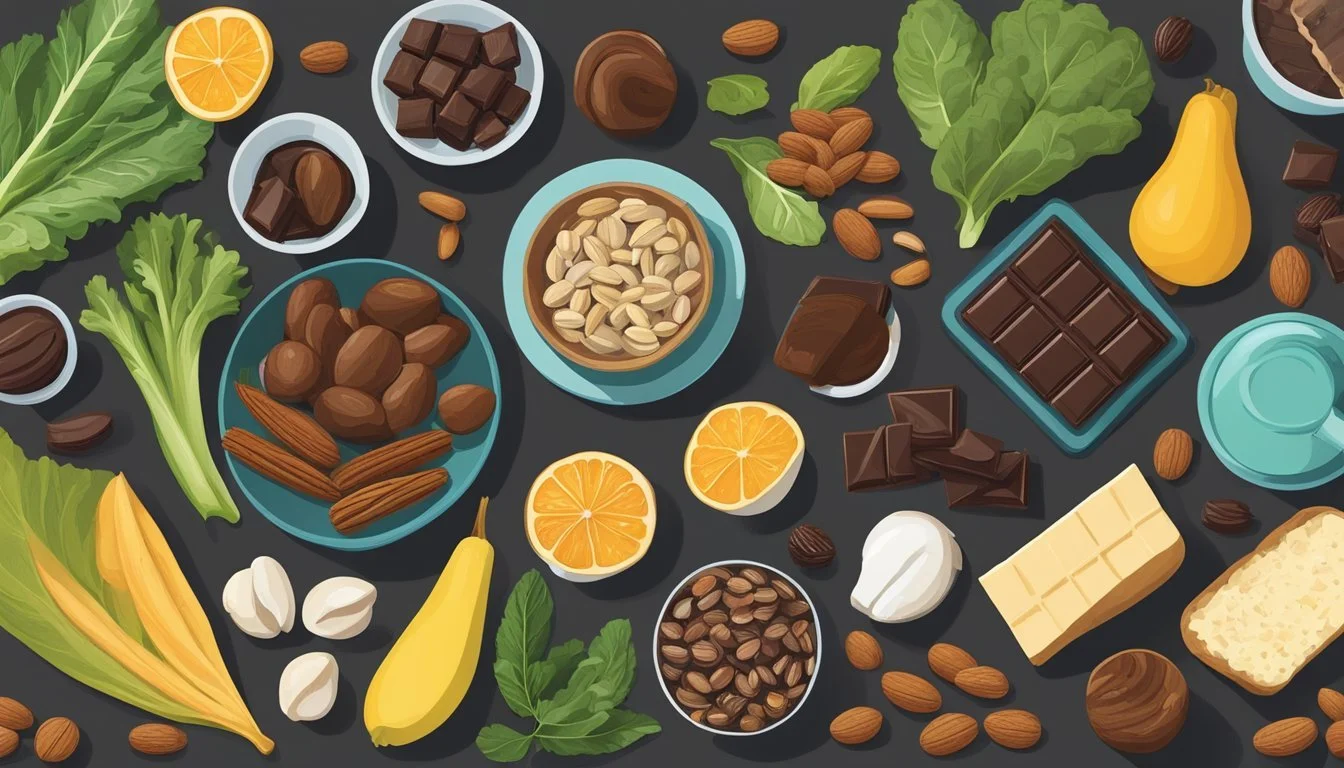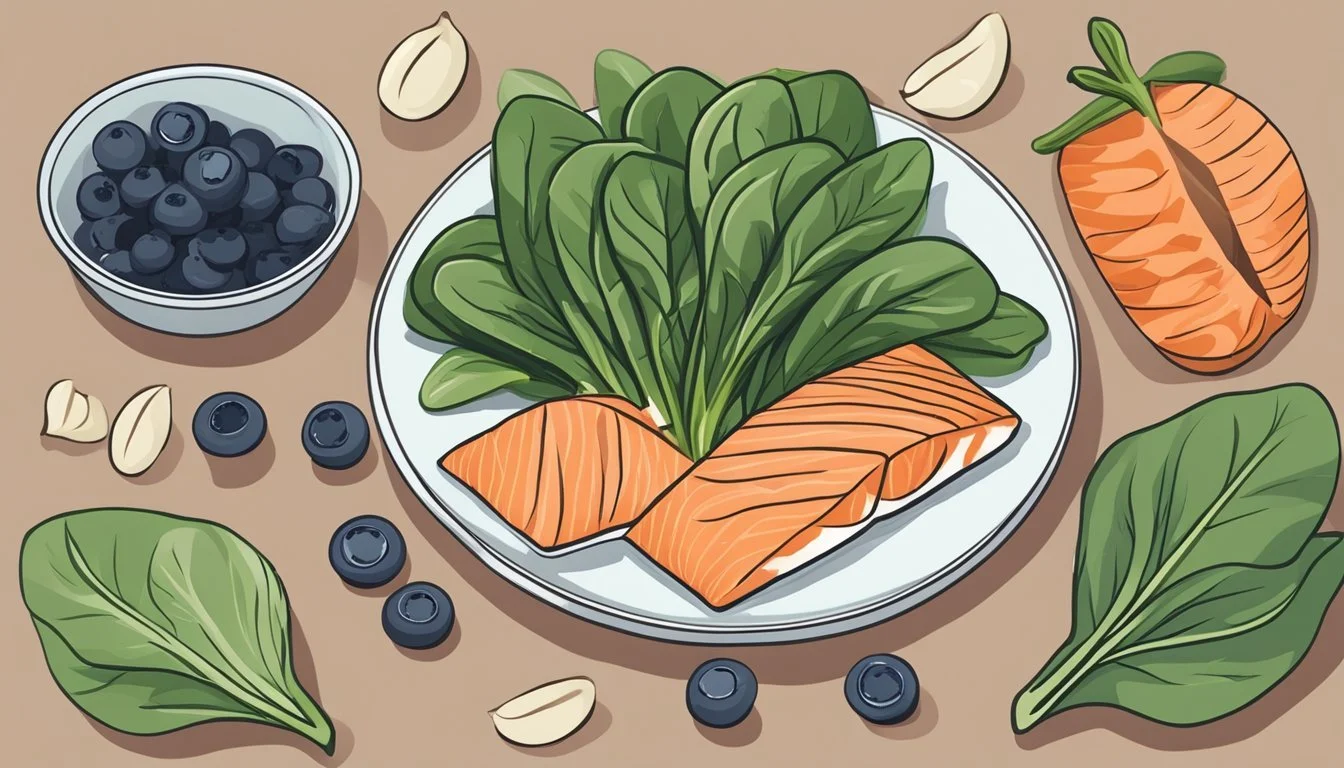12 Anxiety-Busting Foods to Incorporate into Your Diet
Science-Backed Choices for Mental Wellness
Anxiety can significantly impact daily life, affecting both mental and physical well-being. While professional help is often necessary for managing anxiety disorders, certain dietary choices may help alleviate symptoms. Incorporating specific foods into your diet can potentially reduce stress and anxiety levels by providing essential nutrients that support brain function and hormone regulation.
Nutritional strategies play a crucial role in overall health, including mental health. Some foods contain compounds that may help calm the nervous system, reduce inflammation, and promote the production of neurotransmitters associated with mood regulation. By making informed choices about what to eat, individuals can take proactive steps towards managing their anxiety through dietary means.
1) Dark Chocolate
Dark chocolate has gained recognition as a potential ally in managing anxiety. This delectable treat contains compounds that may help reduce stress and promote relaxation.
Rich in magnesium, dark chocolate can support healthy brain function. Magnesium deficiency has been linked to increased anxiety symptoms, making this mineral an important dietary consideration.
Dark chocolate also contains flavonoids, antioxidants that may improve mood and cognitive function. These compounds can help protect brain cells from oxidative stress.
The cocoa in dark chocolate stimulates the production of endorphins, the body's natural feel-good chemicals. This effect may contribute to a sense of well-being and reduced anxiety.
For maximum benefits, choose dark chocolate with a high cocoa content, ideally 70% or above. Enjoy it in moderation as part of a balanced diet to potentially ease anxiety symptoms.
2) Blueberries
Blueberries are a powerful ally in the fight against anxiety. These small berries pack a punch when it comes to antioxidants, particularly flavonoids, which have been linked to reduced stress and improved mood.
Research suggests that regular consumption of blueberries may help lower cortisol levels, a hormone associated with stress. The high vitamin C content in blueberries also supports a healthy immune system, which can be compromised during periods of anxiety.
Incorporating blueberries into your diet is simple and delicious. Add them to your morning cereal or oatmeal for a nutritious boost. They make an excellent snack on their own or mixed into yogurt.
Blueberries can also be blended into smoothies or used as a topping for salads. For a sweet treat, try adding them to whole-grain pancakes or muffins.
The versatility of blueberries makes them an easy addition to various meals throughout the day. By regularly consuming this anxiety-busting food, you may experience improvements in your overall mood and stress levels.
3) Salmon
Salmon is a nutritional powerhouse when it comes to anxiety reduction. This fatty fish is rich in omega-3 fatty acids, particularly EPA and DHA, which have been linked to improved mental health.
Studies have shown that omega-3s can help reduce inflammation in the body and brain, potentially alleviating symptoms of anxiety and depression. Salmon is also an excellent source of vitamin D, which plays a crucial role in mood regulation.
The protein content in salmon provides essential amino acids that support neurotransmitter production. These neurotransmitters, such as serotonin, are vital for maintaining emotional balance and reducing anxiety.
Incorporating salmon into your diet two to three times a week can contribute to better overall mental health. Grilled, baked, or poached salmon are all healthy preparation methods that preserve its nutritional benefits.
For those who don't enjoy fish, salmon oil supplements can be an alternative way to obtain these anxiety-busting nutrients. However, it's always best to consult with a healthcare professional before starting any new supplement regimen.
4) Chamomile Tea
Chamomile tea is renowned for its calming properties and potential to alleviate anxiety symptoms. This herbal beverage has been used for centuries as a natural remedy to promote relaxation and reduce stress.
Research suggests that chamomile tea may have a positive impact on generalized anxiety disorder (GAD). A study published in Phytomedicine found that long-term use of chamomile significantly reduced moderate-to-severe symptoms of GAD.
The soothing effects of chamomile tea extend beyond anxiety relief. It may also help improve sleep quality, which is often disrupted in individuals experiencing anxiety. Regular consumption of this mild, slightly sweet tea could contribute to better overall well-being.
Chamomile tea is easy to incorporate into daily routines. Experts recommend drinking 2 to 3 cups per day to experience its potential benefits. It can be enjoyed hot or cold, making it a versatile option for anxiety management.
While more research is needed to fully understand the mechanisms behind chamomile's anxiety-reducing properties, its long history of use and promising study results make it a worthy addition to an anxiety-busting diet.
5) Pumpkin Seeds
Pumpkin seeds offer a nutritious option for those seeking to reduce anxiety through dietary choices. These small but mighty seeds contain high levels of magnesium, a mineral known for its calming effects on the nervous system.
Zinc, another key nutrient found in pumpkin seeds, plays a role in regulating mood and may help alleviate symptoms of anxiety. The seeds are also rich in tryptophan, an amino acid that aids in the production of serotonin, a neurotransmitter associated with feelings of well-being.
Research suggests incorporating 1-2 ounces (28-56 grams) of pumpkin seeds into one's daily diet may provide anxiety-reducing benefits. This amount can easily be added to meals or enjoyed as a snack.
Pumpkin seeds can be consumed raw, roasted, or as part of a trail mix. They make a crunchy addition to salads, yogurt, or oatmeal. For those who prefer a smoother texture, ground pumpkin seeds can be sprinkled over dishes or blended into smoothies.
Regular consumption of pumpkin seeds may contribute to balanced hormones and improved overall mental health. Their versatility and nutrient density make them a practical choice for individuals looking to support their emotional well-being through nutrition.
6) Greek Yogurt
Greek yogurt is a nutritious food that may help reduce anxiety symptoms. It contains probiotics, beneficial bacteria that support gut health and potentially influence mood.
Research suggests a connection between gut health and mental well-being. The probiotics in Greek yogurt may positively impact the gut-brain axis, potentially alleviating anxiety.
Greek yogurt is also rich in protein, which helps stabilize blood sugar levels. This can prevent mood swings and irritability often associated with anxiety.
Additionally, Greek yogurt provides calcium and vitamin D. These nutrients play a role in neurotransmitter function and may contribute to improved mood regulation.
Incorporating Greek yogurt into one's diet is simple. It can be eaten plain, mixed with fruit, or used as a base for smoothies. For those seeking a savory option, Greek yogurt works well as a dip or sauce ingredient.
7) Spinach
Spinach is a nutritional powerhouse that can play a significant role in reducing anxiety. This leafy green vegetable is rich in magnesium, a mineral known for its calming effects on the nervous system.
Magnesium helps regulate neurotransmitters and has been linked to decreased anxiety and improved mood. Spinach also contains high levels of folate, which aids in the production of dopamine and serotonin, neurotransmitters that contribute to feelings of well-being.
The iron content in spinach supports proper oxygen circulation in the body, potentially helping to alleviate symptoms of anxiety such as shortness of breath. Additionally, spinach provides vitamin C, an antioxidant that can help reduce stress levels.
Incorporating spinach into one's diet is easy and versatile. It can be added to salads, smoothies, or sautéed as a side dish. Spinach can also be blended into pesto or added to soups and stews for a nutrient boost.
Regular consumption of spinach may contribute to a more balanced mood and reduced anxiety levels. Its combination of essential nutrients makes it a valuable addition to an anxiety-reducing diet.
8) Avocado
Avocados are a nutrient-dense fruit that can help reduce anxiety. They contain high levels of B vitamins, which play a crucial role in regulating mood and nervous system function.
These creamy fruits are rich in magnesium, a mineral known for its calming properties. Magnesium deficiency has been linked to increased anxiety-related behaviors, making avocados a valuable addition to an anti-anxiety diet.
Avocados also provide a good source of healthy fats, particularly monounsaturated fats. These fats support brain health and can help stabilize mood. The omega-3 fatty acids found in avocados may contribute to reducing inflammation in the body, which is associated with anxiety and depression.
The high fiber content in avocados can help regulate blood sugar levels. Stable blood sugar is important for maintaining a balanced mood and reducing anxiety symptoms.
Incorporating avocados into meals is easy. They can be added to salads, smoothies, or spread on toast. Eating half an avocado daily can provide significant nutritional benefits and potentially help manage anxiety symptoms.
9) Almonds
Almonds are a nutritional powerhouse that can help reduce anxiety symptoms. These nuts are rich in magnesium, a mineral that plays a crucial role in regulating neurotransmitters and promoting relaxation.
Low magnesium levels have been associated with increased anxiety and depression. Consuming almonds regularly can help boost magnesium intake and potentially ease anxiety.
A one-ounce serving of almonds provides about 20% of the daily recommended value of magnesium. This makes them an excellent choice for those looking to increase their magnesium consumption naturally.
Almonds also contain vitamin E, an antioxidant that may help protect brain cells from oxidative stress. This protection could contribute to better mental health and reduced anxiety levels.
The healthy fats in almonds can help stabilize blood sugar levels, which is important for maintaining mood balance. Sudden drops in blood sugar can lead to irritability and anxiety-like symptoms.
Incorporating almonds into the diet is easy. They can be eaten as a snack, added to salads, or used in baking. For optimal benefits, aim for a small handful of almonds daily as part of a balanced diet.
10) Turmeric
Turmeric is a vibrant yellow spice that has gained attention for its potential anxiety-reducing properties. This powerful herb contains curcumin, a compound known for its anti-inflammatory and antioxidant effects.
Research suggests that curcumin may help regulate neurotransmitters in the brain, potentially alleviating symptoms of anxiety and depression. Some studies have shown that turmeric supplementation can reduce anxiety levels in individuals with various mood disorders.
Adding turmeric to your diet is easy. You can sprinkle it on roasted vegetables, add it to soups and stews, or blend it into smoothies. For better absorption, combine turmeric with black pepper and a source of healthy fats.
Turmeric tea is another simple way to incorporate this spice into your routine. Steep ground turmeric in hot water with a pinch of black pepper for a soothing beverage.
While turmeric is generally safe, it's important to consult with a healthcare professional before using it as a supplement, especially if you have any pre-existing conditions or are taking medications.
11) Chickpeas
Chickpeas are a versatile legume that can play a significant role in managing anxiety. These small, round beans are packed with nutrients that support mental health and overall well-being.
Chickpeas are an excellent source of protein and fiber, which help stabilize blood sugar levels. This stabilization can prevent mood swings and reduce anxiety symptoms.
The high content of B vitamins in chickpeas, particularly B6, is crucial for the production of serotonin and other neurotransmitters that regulate mood. These nutrients contribute to a calmer state of mind.
Chickpeas also contain tryptophan, an amino acid that serves as a precursor to serotonin. Increased serotonin levels are associated with improved mood and reduced anxiety.
The magnesium found in chickpeas is known for its calming effects on the nervous system. It can help relax muscles and promote better sleep, both of which are beneficial for anxiety management.
Incorporating chickpeas into one's diet is easy. They can be added to salads, blended into hummus, roasted for a crunchy snack, or used in various recipes. Their mild, nutty flavor makes them a versatile ingredient in many dishes.
12) Oatmeal
Oatmeal is a powerful food for reducing anxiety and stress. This whole grain is rich in complex carbohydrates, which help increase serotonin production in the brain.
Serotonin is a neurotransmitter that promotes feelings of calmness and well-being. By consuming oatmeal, individuals may experience improved mood and reduced anxiety levels.
Oats are also an excellent source of fiber, which can help stabilize blood sugar levels. This stabilization prevents sudden spikes and crashes that could trigger anxiety symptoms.
The B vitamins found in oatmeal, particularly B6, play a crucial role in brain function and mood regulation. These nutrients support the nervous system and help the body manage stress more effectively.
Oatmeal's versatility makes it easy to incorporate into various meals. It can be enjoyed as a warm breakfast, added to smoothies, or used in baked goods for a nutritious boost.
Regular consumption of oatmeal may contribute to better gut health. A healthy gut microbiome is increasingly linked to improved mental health and reduced anxiety.
Understanding the Link Between Diet and Anxiety
The food we consume plays a significant role in our mental well-being. Certain nutrients and dietary patterns can impact anxiety levels, influencing both the onset and management of anxiety disorders.
How Diet Influences Mental Health
Diet directly affects brain function and neurotransmitter production. Nutrients from food provide the building blocks for neurotransmitters like serotonin, which regulates mood and anxiety. A balanced diet rich in whole foods supports optimal brain health.
Omega-3 fatty acids, found in fish and nuts, have anti-inflammatory properties that may reduce anxiety symptoms. Antioxidants in fruits and vegetables protect brain cells from oxidative stress, potentially lowering anxiety risk.
Processed foods and sugar can trigger inflammation and blood sugar fluctuations, exacerbating anxiety. Caffeine and alcohol can also worsen symptoms in some individuals.
The Role of Nutrients in Anxiety Management
Specific nutrients have been linked to anxiety reduction. Magnesium, present in leafy greens and nuts, helps regulate neurotransmitters involved in stress response. B vitamins support nervous system function and are found in whole grains and lean meats.
Probiotics in fermented foods may influence the gut-brain axis, potentially alleviating anxiety. Zinc, found in oysters and pumpkin seeds, plays a role in brain health and mood regulation.
Tryptophan, an amino acid in turkey and eggs, is a precursor to serotonin. Adequate vitamin D intake, through sunlight exposure or supplements, may also help manage anxiety symptoms.
Key Nutrients for Reducing Anxiety
Certain nutrients play a crucial role in regulating mood and alleviating anxiety symptoms. Two essential nutrients that have shown promise in reducing anxiety are magnesium and omega-3 fatty acids.
Magnesium
Magnesium is a mineral that helps regulate neurotransmitters and hormones involved in stress response. Low magnesium levels have been linked to increased anxiety-related behaviors.
Foods rich in magnesium include:
Dark leafy greens (spinach, kale)
Nuts and seeds (almonds, pumpkin seeds)
Whole grains (brown rice, quinoa)
Legumes (black beans, lentils)
Dark chocolate
Incorporating these foods into your diet can help boost magnesium intake. Aim for 310-420 mg of magnesium daily, depending on age and gender.
Omega-3 Fatty Acids
Omega-3 fatty acids are essential fats that support brain health and may help reduce anxiety symptoms. These healthy fats can be found in various foods and supplements.
Good sources of omega-3s include:
Fatty fish (salmon, sardines, anchovies)
Walnuts
Flaxseeds and chia seeds
Avocados
Fish oil supplements
The recommended daily intake of omega-3s is 1.1-1.6 grams for adults. Eating fatty fish twice a week or taking a high-quality fish oil supplement can help meet this requirement.
Research suggests that omega-3s may help reduce inflammation and support neurotransmitter function, potentially easing anxiety symptoms. However, more studies are needed to fully understand their effects on anxiety disorders.
Practical Tips for Incorporating Anxiety-Busting Foods into Your Diet
Integrating anxiety-reducing foods into your daily meals can be simple and enjoyable. By planning ahead and having some quick recipes on hand, you can easily boost your intake of nutrients that support mental well-being.
Meal Planning Strategies
Start by creating a weekly meal plan featuring anxiety-busting foods. Include fatty fish like salmon twice a week for omega-3s. Add leafy greens to at least one meal per day. Stock up on whole grains, colorful fruits, and vegetables.
Keep a list of anxiety-friendly snacks handy. Examples include Greek yogurt with berries, whole grain crackers with avocado, or a small handful of nuts.
Prep ingredients in advance to save time. Wash and chop vegetables, cook whole grains, and portion out snacks at the beginning of the week.
Quick And Easy Recipes
Try a spinach and berry smoothie for breakfast. Blend spinach, mixed berries, Greek yogurt, and a splash of almond milk for a nutrient-packed start to your day.
For lunch, make a tuna salad with whole grain bread. Mix canned tuna with mashed avocado instead of mayo. Add chopped celery and red onion for crunch.
Prepare a simple salmon dinner by baking a fillet with lemon and dill. Serve with roasted sweet potato and steamed broccoli for a balanced plate.
For a quick snack, spread almond butter on apple slices. This combination provides protein, healthy fats, and complex carbohydrates to stabilize mood and energy levels.







